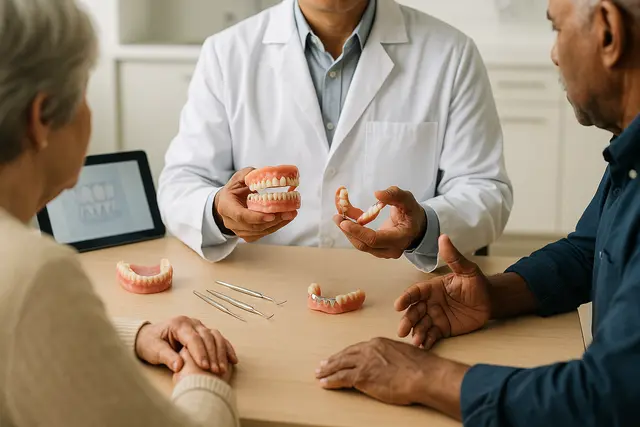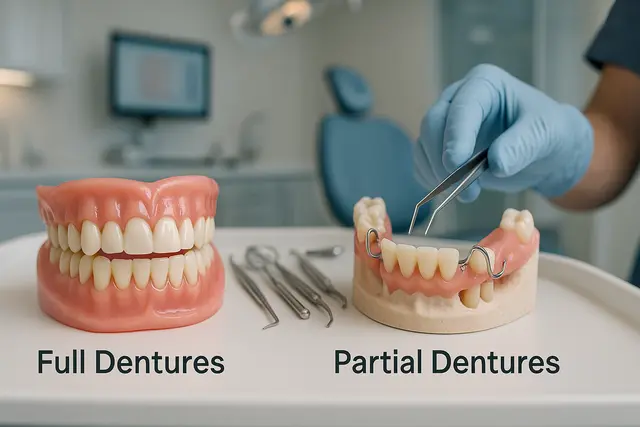Prosthodontics
5 min read
Sep 15, 2025
Exploring Acrylic Denture Benefits and Drawbacks
Missing teeth can affect more than just your smile, they can impact your ability to speak, eat, and feel confident. For many patients exploring tooth replacement options, acrylic dentures offer an accessible, affordable solution that blends function with form. Before making a decision, it’s important to understand what these dentures offer, their limitations, and how they compare to other materials.

If you’re considering a denture to replace missing teeth, chances are you’ve heard of acrylic dentures. These are the classic go-to in many family dental offices, and for good reason. But before you take the plunge into pink acrylic and polished smiles, let’s get real about what these dentures offer, what they don’t, and how to decide if they’re your best fit.
Denture Basics and Why Dental Solutions Matter
Dentures are often the unsung heroes of dentistry. They restore more than just your smile, they let you chew, speak, and laugh with confidence. From full dentures to partial denture designs, these removable dental solutions are designed to replace missing teeth while supporting oral health and overall well-being.
The dental world offers a variety of denture types: acrylic, metal partial dentures, flexible dentures, and even porcelain dentures. Knowing the difference matters. Not all dentures are created equal, and choosing the right one can be the difference between loving your smile or constantly adjusting it.
What Makes Acrylic Denture Options So Popular
An acrylic denture is often the first stop on the denture journey. Why? Because they’re affordable, quick to make, and surprisingly lightweight. Whether it’s a full or acrylic partial denture, these are made from acrylic resin, a plastic resin that can be easily shaped and colored to match your gums and existing teeth.
The pink acrylic base gives them a lifelike appearance, and for patients seeking a fast and budget-friendly fix, acrylic dentures are an excellent starting point. They’re especially common as immediate dentures after extractions, while your gums heal and settle.
Acrylic Partial Dentures and Their Role
Not missing a full arch of teeth? Acrylic partial dentures come into play. These are ideal when you have some remaining natural teeth, and they help fill the gaps without needing dental implants. A well-designed acrylic partial can restore your smile while keeping existing teeth in alignment.
While acrylic partials tend to be a bit bulkier than their metal-based cousins, they still do the job. And let’s be honest, if your budget’s tight or you want a custom denture in a hurry, acrylic may be your go-to.
Understanding Denture Material Options
Let’s talk about materials used in dentures. Acrylic resin is one of the most widely used, especially for temporary or transitional dentures. But it’s not your only option. Porcelain, metal alloy, and flexible materials are also in the game.
Porcelain dentures: Offer better aesthetics and feel more like natural teeth, but they come with a higher cost and are heavier.
Metal dentures: Are known for durability and a snugger fit, although metal clasps may show.
So when comparing acrylic versus metal dentures, it boils down to what you value most: cost, aesthetics, comfort, or durability.
How Dentures Are Made and Why It Matters
Dentures are made through a detailed process that combines impressions, bite molds, and a lot of dental artistry. Whether you opt for acrylic or metal, the key is getting a great fit. A dental clinic that prioritizes custom denture crafting will ensure your dentures feel as natural as they look.
And yes, dentures may need adjustments as your gums change. This is totally normal, especially in the first few months.
The Pros of Acrylic Dentures You Should Know
Let’s shine some light on why acrylic options are still a favorite in many dentistry circles:
Lower cost: One of the biggest draws. The initial cost of acrylic dentures is much more affordable than metal or porcelain options.
Quick production: Need teeth fast? Acrylic wins here.
Easily repairable: Crack or chip? No biggie. Repairs are typically easy and inexpensive.
Great for temporary or immediate dentures: These work well while waiting for a more permanent solution.
Lightweight and user-friendly: Dentures are lightweight and easier to get used to, especially for first-time denture wearers.
The Drawbacks That May Not Suit Everyone
Of course, no denture is perfect. Acrylic has its flaws, and it's best to know what you're signing up for:
Durability trade-off: Acrylic dentures tend to be less durable than metal options. They may crack under pressure or daily wear.
Bulkier design: Some find acrylic partials thicker or less comfortable, especially when compared to metal partial dentures.
May not be suitable for long-term use: Though great for temporary fixes, long-term wear may require more maintenance or replacement.
Can stain more easily: That morning coffee might leave a mark.
Need to be replaced every five years: With proper care, you might stretch it, but most acrylic dentures are often due for replacement around this timeframe.
Dentures and Your Oral Health Goals
No matter the type of denture you choose, your oral health and overall comfort should always come first. Dentures require existing teeth or healthy gums to anchor properly, and poor fit can affect everything from speech to chewing.
Regular visits to your dentist can ensure your dentures maintain their fit and function. Plus, routine checkups help you avoid gum irritation or bone loss over time.
Choosing the Right Denture Material for Your Lifestyle
So, acrylic or metal? Porcelain or flexible? The answer depends on your goals, habits, and, yes, your wallet. Patients seeking a natural look with higher durability might lean toward porcelain or metal dentures. Those who prioritize a quicker fix or lower cost may prefer acrylic dentures.
If you want a denture that looks good, feels decent, and doesn’t break the bank, acrylic may be just the right pick. But if durability is a top concern, you may want to consider the added benefits of metal partial dentures or flexible dentures.
Visiting a Trusted Family Dental Clinic Can Help
You don’t have to make this decision alone. Visiting a family dental clinic with experience in full and partial denture types can provide clarity. A great dentist will assess your dental needs, walk you through acrylic vs metal options, and give expert guidance based on your unique case.
And yes, the best clinics understand that dentures are an emotional choice, not just a functional one. Whether you want a denture that’s practically invisible, highly durable and resistant, or simply gets the job done, they’ll help you make the best decision.
What Are Acrylic Dentures and Why Are They Popular?
Acrylic dentures are removable dental appliances made from acrylic resin, designed to replace missing teeth and gums. They are popular because they are affordable, lightweight, and relatively quick to make compared to other denture types. Their pink acrylic base blends naturally with gum tissue, and they are often used as immediate or transitional dentures after extractions. Many patients choose acrylic dentures as a starting point because they offer a fast, functional, and budget-friendly solution.
What Are the Main Benefits of Acrylic Dentures?
The biggest advantages of acrylic dentures are cost and convenience. They are usually more affordable than porcelain or metal dentures, making them accessible to a wider range of patients. They can also be produced faster, which is helpful if you need teeth replaced quickly. Acrylic dentures are easy to repair if they crack or chip, and they work especially well as temporary or immediate dentures while gums are healing. Their lightweight feel also makes them easier for first-time denture wearers to adjust to.
What Drawbacks Should I Consider Before Choosing Acrylic Dentures?
Acrylic dentures are not as durable as other options, which means they may crack under pressure or wear down more quickly. They often feel bulkier than metal or flexible dentures, which can affect comfort and speech at first. Acrylic dentures may stain more easily from foods and drinks like coffee or wine, and they generally need to be replaced every five years or so. While they are an excellent short-term or budget-conscious option, they may require more maintenance in the long run.
How Do Acrylic Dentures Compare to Other Denture Materials?
Compared to porcelain, metal, or flexible dentures, acrylic dentures prioritize affordability and speed over durability. Porcelain offers the most natural look and feel but costs significantly more and is heavier. Metal dentures are slim, durable, and offer a stronger bite, though their clasps may show when smiling. Flexible dentures provide comfort and a more discreet appearance but are more expensive than acrylic. The right choice depends on your budget, lifestyle, and how long you plan to wear the dentures.
Read Next
Related Posts

Prosthodontics
Differences Between Zirconia and Acrylic Dentures: Benefits, Drawbacks, and Tips
Choosing between zirconia and acrylic for dental implants can feel overwhelming, especially when both materials offer unique advantages. This guide breaks down the essential differences, benefits, and limitations of each option to help you make a more confident, informed decision about your dental restoration journey.
5 min read
Nov 03, 2025

Prosthodontics
Dentures vs. Partial Dentures Pros and Cons: Helping You Make the Best Choice
Tooth loss can impact everything from your self-confidence to your ability to enjoy your favorite foods. Fortunately, modern dentistry offers practical solutions that restore both function and aesthetics. Two of the most common options are full dentures and partial dentures, each with its own advantages and limitations.
5 min read
Nov 03, 2025

Prosthodontics
Partial Dentures vs. Full Dentures Comparison: What Works Best for Your Situation
Choosing between partial and full dentures is an important step in restoring both your smile and confidence. With each option designed to meet different dental needs, understanding their differences can help you make the right decision for your oral health and lifestyle.
5 min read
Nov 03, 2025
Don’t have time to research every dentist around you?
See why 30k+ patients trusted us